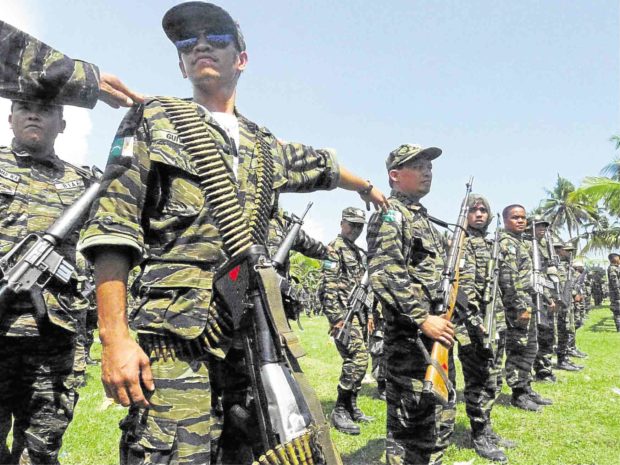Joint committee prepares to disarm MILF fighters

MORO FIGHTERS Moro Islamic Liberation Front fighters assemble at Camp Darapanan in Sultan Kudarat, Maguindanao province. —BONG S. SARMIENTO
COTABATO CITY, Maguindanao, Philippines — The government and the Moro Islamic Liberation Front (MILF) are preparing for the difficult task of decommissioning some 12,000 Moro fighters this year, officials said on Monday.
The Joint Normalization Committee (JNC) of the government and the MILF is fast-tracking the implementation of the Annex on Normalization, one of the major components of the Comprehensive Agreement on the Bangsamoro (CAB), according to Ariel Hernandez, JNC chair.
“[We are aiming] for the normalization process to be felt … in the [MILF] communities,” said Hernandez, also a member of the government’s peace implementing panel.
He said representatives from the government and the MILF met on Samal Island recently to harmonize their efforts and ensure the speedy decommissioning of the former Moro rebels under the CAB.
The CAB is the final peace agreement signed by the government and the MILF in 2014 after four decades of conflict in parts of Mindanao that have left over 120,000 people dead, including civilians.
Article continues after this advertisementP1.2-B ‘goodwill’ cash aid
Article continues after this advertisementPresidential Peace Adviser Carlito Galvez Jr. earlier told the Inquirer that the government needed an initial P1.2 billion in “goodwill” cash assistance to the 12,000 MILF fighters who would be disarmed this year.
This makes up about 30 percent of the MILF’s Bangsamoro Islamic Armed Forces (BIAF), which would be decommissioned in accordance with the establishment of the Bangsamoro Autonomous Region in Muslim Mindanao (BARMM).
After the CAB was signed during the administration of President Benigno Aquino III in 2015, the MILF decommissioned a group of 145 fighters in a ceremony in Maguindanao province.
Another 35 percent of the BIAF will be decommissioned in 2020, with the remainder to be disarmed in the next two years, Galvez said.
Murad Ebrahim, the interim chief minister of the BARMM, said the MILF, which he also chairs, had as many as 40,000 combatants scheduled for the phased decommissioning.
The Independent Decommissioning Body, chaired by an official from Turkey and which counts as members experts from Norway and Brunei and four representatives from the government and the MILF, is tasked with conducting the decommissioning process.
Eduard Guerra, chair of the MILF panel in the JNC, said the Moro group and the government needed to work closely to hurdle the challenges in the normalization process.
“We should work in partnership and always with consultation,” Guerra said.
Productive zones
President Duterte signed Executive Order No. 79 in April to implement the Annex on Normalization, which also calls for transforming six MILF camps into productive and peaceful zones.
The government later activated the Inter-Cabinet Cluster Mechanism on Normalization to determine the roles of 17 government agencies in the normalization process.
Galvez said it was critical for both the government and the BARMM to deal with the “drivers and triggers,” especially poverty, that bred conflict in parts of Mindanao.
He said the “normalization track” would be implemented in four components—security aspect, socioeconomic development program, confidence-building measures and transitional justice and reconciliation.
The security component covers, among others, the decommissioning of combatants, weapons management, establishment of the Joint Peace and Security Teams, clearing of unexploded ordnance, disbandment of private armed groups, and redeployment of government troops, Galvez said.